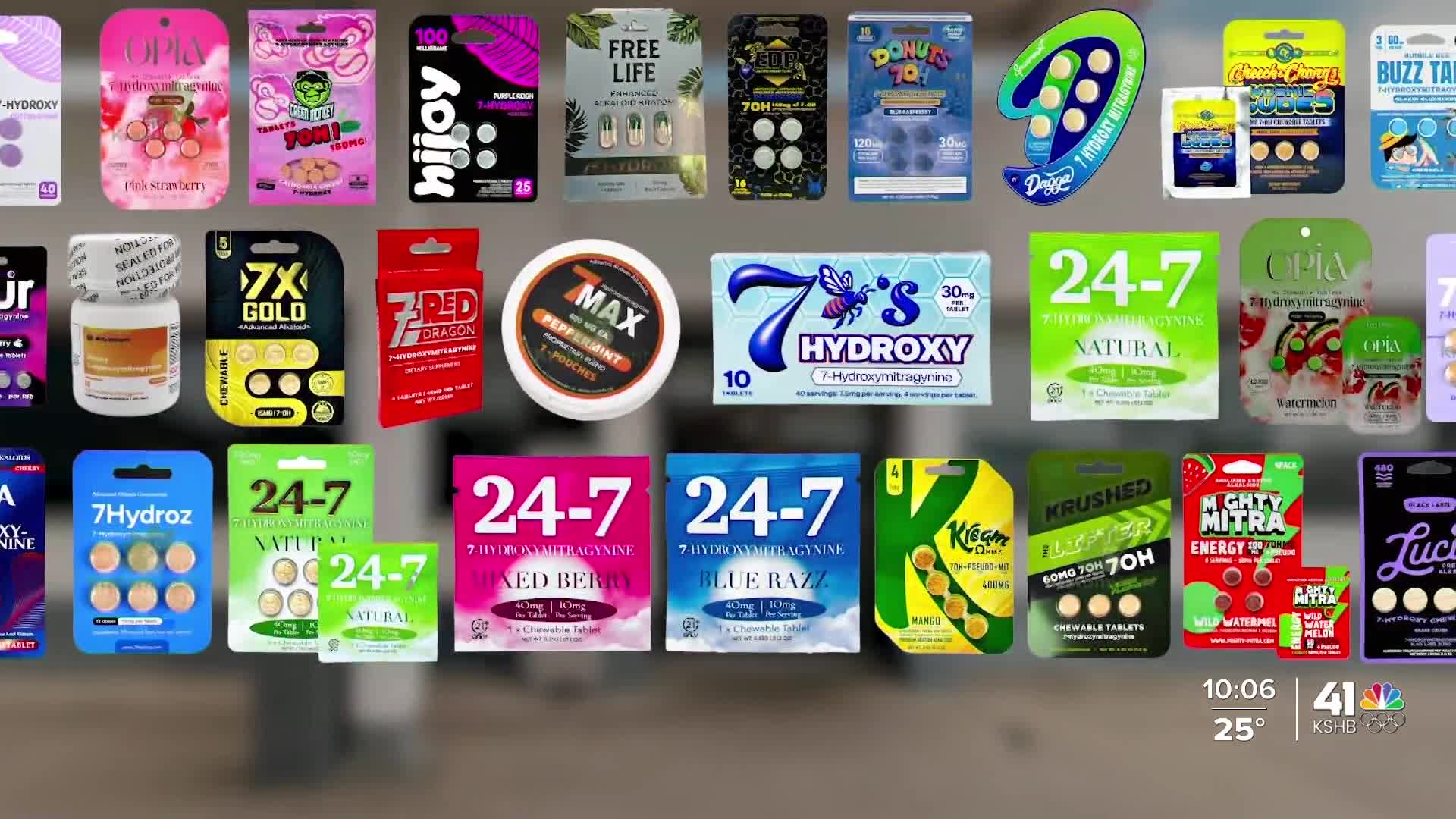KSHB 41 reporter Isabella Ledonne reports on stories in Overland Park, Johnson County and topics about government accountability. Share your story idea with Isabella.
—
A synthetic chemical product is flying off gas station and convenience store shelves in Kansas City. It's known as 7-OH, and is a synthetic derivative of the Kratom plant.
KSHB 41 News first reported on the products last week. But experts are growing concerned with the effects it has on users, even comparing it to heroin and fentanyl.
For centuries, people have used kratom as an herbal treatment for pain and energy.

Within the plant is a small percentage of a compound known as 7-hydroxymitragynine (7-OH). A local business owner in Kansas City learned how to produce 7-OH on its own and has sold it over the counter for the last two years.
In this new series, Strong High Weak Laws, we're going to be diving deep into what these products are, how they're different and how they're being sold in the Kansas City community and in the country with little to no regulation.
The rise in popularity with kratom's derivative, 7-OH, has led some addiction prevention advocates to coin it with a new name.

"It's definitely gas station heroin," Healing House KC Recovering Housing Manager Joey Thomas said.
7-OH can come in pill form, liquid form, gummies or edible sweets.

"It's the wild, wild west out here," Kansas City Councilman Johnathan Duncan said at last Thursday's council meeting.
The products, whether its 7-OH, kratom or alkaloid tablets, have Kansas City voices speaking up.

"There's no age restrictions," Kansas City Councilman Nathan Willett said. "It's a little bit wild what you can actually purchase in gas stations throughout the city or different [convenience] stores."
Most of the 7-OH and kratom products sold cost less than $10, which is about the same price as a latte.

"It's available everywhere and it's highly addictive," Healing House KC Founder and Director Bobbi-Jo Reed said. "It's easy to misuse."
Kratom is the parent plant to 7-OH. Experts with the Global Kratom Coalition and addiction specialists with The University of Kansas Health System explained kratom leaves contain less than 0.05% of the chemical compound 7-OH.

"We always knew that you couldn't extract the 7-OH from the kratom leaf because it's just too little," Global Kratom Coalition Executive Director Matthew Lowe said. "It would never be commercially viable."
But that's exactly what Kansas City business owner Vince Sanders of American Shaman did two years ago.

"You take mitragynine, the original extract from the kratom leaf, and you put it in a vessel with different reagents that then convert it to 7-OH," Sanders said. "If I take 10 milligrams of pure 7-OH, I feel amazing."
Both kratom and 7-OH bind to your opiate receptor when ingested. Recent research has found that 7-OH is up to 40% stronger than morphine.

"The effects are going to be very similar to an opiate," Dr. Roopa Sethi, University of Kansas Health System addiction psychiatrist, said. "You are ingesting a more potent form of that kratom that you are going to use and that is probably going to give you a better high."
American Shaman sells pure 7-OH pills for less than $10, marketing them as a safe alternative for painkillers and harm reduction.
"It works and that's why people come," Sanders said.
But addiction experts see it as a concerning product after seeing a staggering uptick in patients seeking help from the effects of 7-OH and even kratom.
"Some of the patients [in our clinic] might have started it to get off the opiates, but are struggling with a bigger addiction now," Dr. Sethi said. "I have a patient who has told me that they have used up to $1,600 a month trying to buy these 7-OH capsules."
Kratom and 7-OH are currently unregulated in Missouri and Kansas. Both states have issued warnings against 7-OH, following the FDA's warning.
According to the American Kratom Association, 19 states have adopted the Kratom Consumer Protection Act, which limits 7-OH percentage content in products, age restrictions and labeling guidelines. Three states have proposed bans and six states have banned the product. 18 states, including Kansas and Missouri, have legal kratom with little to no regulation.
“We are seeing natural kratom consumers that have consumed the leaf for literally 15 years, net positive to their life, get given a free sample of concentrated, synthetic 7-OH and within two months, their lives are turned upside down, because your tolerance grows really, really quickly," Lowe said.
Kansas City could be one of the first municipalities in Missouri to establish regulations for the synthetic 7-OH and its parent plant, kratom.
The Kansas City, Missouri City Council unanimously passed a resolution directing the city manager to review regulations in other communities and report back in 30 days with a plan.
"If it's hurting our community and has a potential of hurting our community, it's something that needs to be regulated," Councilman Willett said. “This derivative is so new and we want to be proactive on this."
Addiction specialists explained it's a good start.
"For something to be so freely distributed in our community breaks my heart because we get the disaster," Reed said. "We get the person that is so broken they don't feel that they can go on."
Over the next few weeks, government accountability reporter Isabella Ledonne is going to continue to bring you the voices and perspectives on how these products are connected to Kansas City and what local leaders are doing about it.
—






